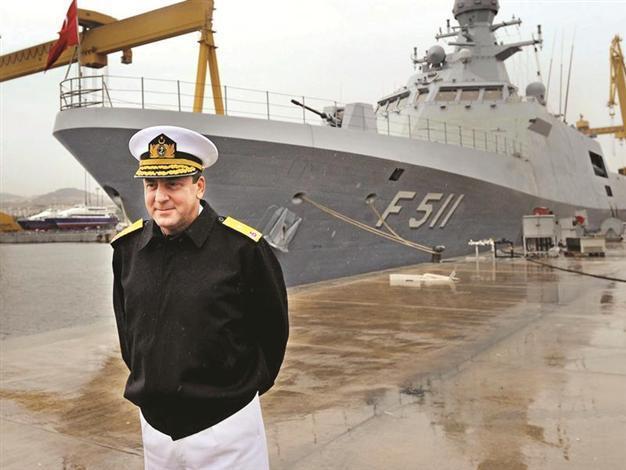Turkey picks Koç to construct six corvettes for $2.5 billion
ANKARA

A Turkish commander poses in front of the Heybeliada corvette, the first output of the naitonal Milgem project.
Turkey’s top defense procurement body decided to begin talks with Koç Holding’s enterprise RMK Marine for the construction of six ships as part of the Milgem national warships project, during its meeting chaired by Prime Minister Erdoğan on Jan. 3.The Defense Industry Executive Committee, which includes Erdoğan, Defense Minister İsmet Yılmaz, Chief of the Turkish General Staff Gen. Necdet Özel and Procurement Chief Murad Bayar, met in Ankara to make crucial decisions on the country’s future military purchases and projects.
The body decided to begin negotiations with Koç’s RMK Marine Ship Building Yard to produce the six Milgem corvettes for the Navy. Dearsan was the other private shipyard candidate in the race for the $2.5 billion deal.
Among the eight corvettes of the Milgem project, the TCG Heybeliada has already been constructed and the TCG Büyükada has been put to sea. Corvettes are the smallest warships in the inventory of the Turkish Navy, as the country has no ocean coasts.
Talks on air defense
The procurement body decided to continue talks on the selection of Turkey’s long-range missile and air defense systems, or T-Loramids, adding more time.
The companies pursuing the estimated $4 billion project are the pan-European Eurosam, maker of the SAMP/T Aster 30; a U.S. partnership between Raytheon and Lockheed Martin, maker of the Patriot-based air defense systems; Russia’s Rosoboronexport, marketing the S300; and China’s China Precision Machinery Export-Import Corp. (CPMIEC), offering its HQ-9.
Several Western officials and experts have said that the Russian and Chinese systems in the Turkish contract bid are not compatible with NATO systems or that their prices are very high.
Turkey has recently solidified a deal with NATO to place six Patriot’s batteries, supplied by Germany, the Netherlands and the U.S., in three provinces to temporarily empower its air defense.
Support for sattalite
The top defense procurement body also announced that they would start talks with Turkish Aerospace Industries (TUSAŞ) in order to develop the Göktürk 3 Satellite Project with the support of the Scientific and Technological Research Council of Turkey (TÜBİTAK) and the Turkish Military Electronics Company (ASELSAN). The procurement body will also negotiate with Turkish missile company Roketsan in launching military and civil satellites into space as part of the Satellite Launch System Project’s pre-concept design phase.
















